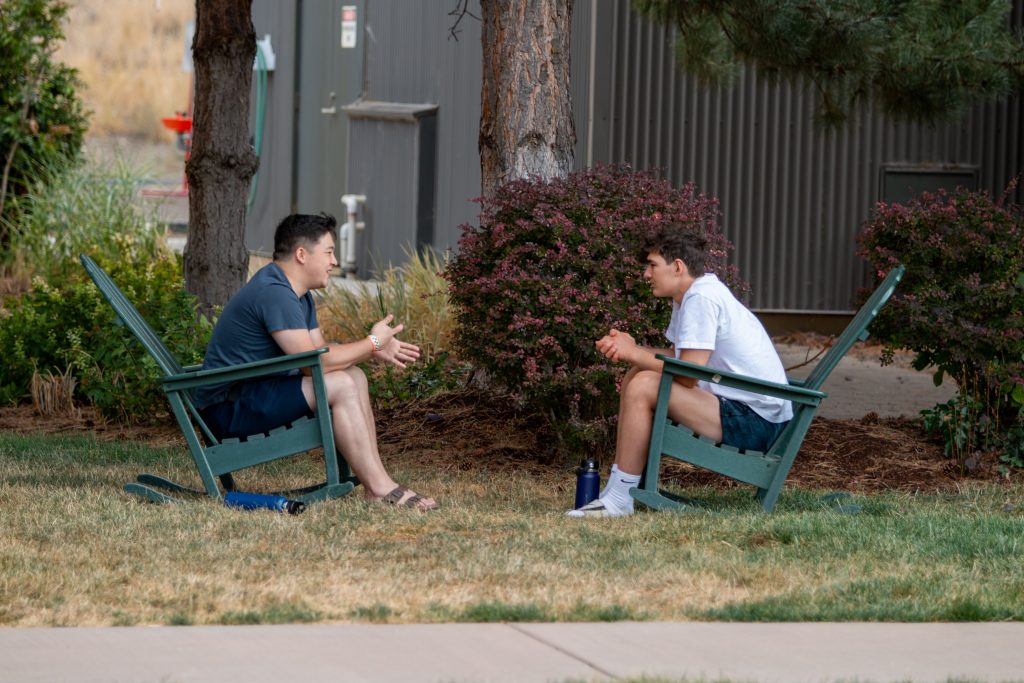There’s nothing quite like a cross-country road trip or a long hike in the woods to deepen a friendship. By the end of my 20s I’d driven across the United States seven times, with a mix of different friends along for each ride. We’d take turns choosing the music and make time for unique roadside stops along the way.
One of my favorite things to do was flip through the pages of a book called 500 Writing Prompts. My friends and I would pass the time discussing our answers to some of its most creative prompts.
We’d ask each other things like, if you could go anywhere in the world for a weekend, where would you go? What food best represents your personality and why? What three musical artists or bands would you host for a backyard concert with friends? If you could replace one of your hands with a utensil, what would it be and why?
That book prompted hours of engaging conversations with old and new friends over the years.
I brought 500 Writing Prompts with me on backcountry hikes during my time as a summer camp counselor. The quirky topics helped pass the time quicker on some of our longer hikes. It made for loads of entertainment and fond memories around our campfires at night.
I still have that book, over a decade later, and every now and then I’ll take it from the shelf and fill in a few answers. It’s not the same as it was on those long drives and hikes, though. There’s something special about having someone else to engage with in conversation. It isn’t nearly as fun to do it alone.
We live in a world of noise and surface-level conversations. And a friend who actively listens and responds with kindness is like finding an oasis amid a wasteland. It refreshes the soul. Even if the topics are more practical than what utensil you’d replace your right hand with, having someone who is willing to have meaningful conversations can make our difficult seasons a bit lighter.
To connect on a deeper level with Generations Z and Alpha, whether you’re a parent, coach, or employer, asking questions is crucial.
These next generations are growing up in the most interconnected time in history. There is no shortage of platforms for people to share their opinions, “life hacks,” recommendations — the list goes on. Their world is far noisier than generations before.
So, when a trusted adult comes along and starts asking genuine questions and showing that they care about a teenager’s answers, it’s like putting on noise-canceling headphones. The chaos mutes for a moment, and they get to dive deeper into meaningful connection.
Despite the interconnectedness of the 21st century, people are more disconnected than ever before. Young Life’s RELATE Project found that between the ages of 16 and 18, the number of teens who say there are people in their lives who they can talk to about things that really matter drops significantly from the ages of 13 to 16.
“We have to be especially aware of teens’ well-being during those two to three years when they’re feeling most disconnected.”
So how do we connect with Gen Z and Gen Alpha, especially in those high school years? First, it’s important to understand their communication preferences. Gen Z and Generation Alpha are digitally fluent. They desire authenticity. And messages that are concise and have a visual are more likely to hold their attention.
The way we ask questions matters. This is especially true as we look to have meaningful conversations and build rapport with teens and adolescents.
Here are a few things to remember as you seek those deeper connections with the young people in your life:
1. Start with Open-Ended Questions
Open-ended questions invite more than short or one-word responses. They encourage deeper insight. They tend to draw out genuine dialogue. And they’re a great way to prompt reflection and self-expression. As you engage with younger generations, try starting conversations with open-ended questions. It’s a great way to encourage them to share their perspectives and experiences. For example:
“What are your thoughts on [current cultural phenomenon]?”
“How do you envision the future of [relevant topic]?”
2. Embrace Digital Platforms
Gen Z and Alpha are most comfortable communicating through digital channels. Try using platforms such as social media and messaging apps to connect with them. Doing so provides an opportunity to engage with them on familiar turf. Polls, surveys, and interactive content are other great ways to learn their opinions and preferences! And don’t forget, the more aesthetic something is, the more likely they are to engage and stick around for further conversations.
3. Be Authentic and Transparent
Authenticity resonates deeply with younger generations, who value sincerity and genuine connection. Sure, you could use 500 Writing Prompts to strike up a conversation, but scripted or insincere questions will rub a lot of them the wrong way. Instead, show genuine curiosity and a willingness to listen! Be transparent about your intentions and motivations. You’ll foster trust and mutual respect with your teen.
And don’t forget, authenticity is not about having all the answers. It’s an ongoing journey, and it’s okay to admit that you’re still learning and growing. The next generations will learn from your example and know the same is true for them.
4. Stay Relevant and Culturally Aware
I lead the 11th-grade girls small group at my church. And I’m constantly having to ask them to define almost every other word they say. “Bussin’”? Isn’t that what a restaurant staff does to clear off a dirty table? “No cap”? Do you mean they left their hat at home? It’s like they speak another language sometimes!
And while you don’t need to brush up on your Gen Z slang to use in everyday conversation, it is important to stay informed about the things they care about.
Ask questions that are relevant to their interests and experiences. It will show your investment in understanding their world and keep them engaged.
A few to get you started might be:
- How do you focus on self-care and mental health in your daily life?
- What social causes are you passionate about?
- What emerging tech trends are you most excited about?
- What do you think Jesus would say about the world we live in today?
5. Encourage Self-Expression and Creativity
Younger generations thrive on opportunities for self-expression and creativity. Provide outlets for them to showcase their talents, passions, and unique perspectives. Ask questions that prompt creative thinking and encourage them to explore their creativity. Foster an environment that celebrates individuality and encourages them to embrace their authenticity.
1 Peter 3:8 says, “Finally, all of you, be like-minded, be sympathetic, love one another, be compassionate and humble.” Likewise, our interactions with Gen Z and Gen Alpha should be marked by compassion, humility, and love, for they are made in the image of God.
Our questions and conversations with them shouldn’t make them feel boxed-in or out of place. They need safe spaces to express their God-given personalities and talents.
6. Listen Actively and Empathetically
You may have heard it said that effective communication is a two-way street. The same is true when creating meaningful connections with the next generations. They need adults who actively listen and respond with genuine empathy.
So, when they respond to your open-ended question, really listen to them. There can often be a lot communicated in how they say something, or even in what they don’t say. And before you offer advice or share about yourself, try asking a follow-up question first. There’s usually a lot more to discover beneath their initial response.
C.S. Lewis wrote in his book The Four Loves, “Friendship, I have said, is born at the moment when one man says to another ‘What! You too? I thought that no one but myself … ” By asking more questions and listening closely to Gen Z and Gen Alpha, we may find ourselves saying the same thing.
And perhaps, by digging a little deeper, we can help them experience new depths in their relationships with Christ.
Creating meaningful relationships with Gen Z and Gen Alpha takes intentionality and thoughtfulness. It matters how we ask questions and how we respond to them. As they are maturing in an increasingly interconnected world, we, too, have the chance to be more connected and invested with them.
So, whether it’s on a long car ride, going for a hike in the woods, or giving them a ride to work or school, don’t be afraid to ask a teen how they’re really doing and then actively listen to what they have to say. You can always break the ice by asking them what food best represents their personality and why.
To learn more about Young Life’s research on Generation Z and Gen Alpha, and to download your own copy of The RELATE Project report, click here.
To become one of the thousands of trusted adults in Young Life’s volunteer network, or to find out how to connect with Young Life in your area, click here!






